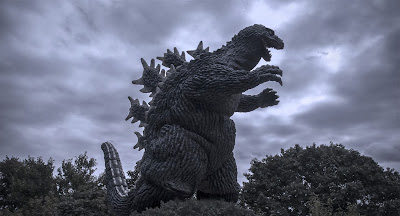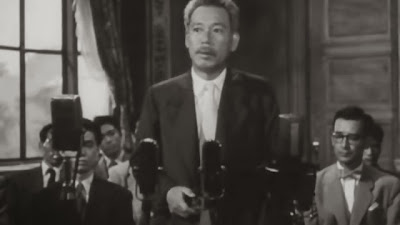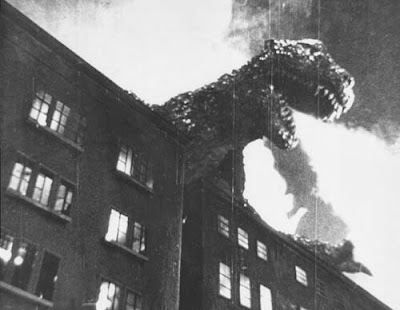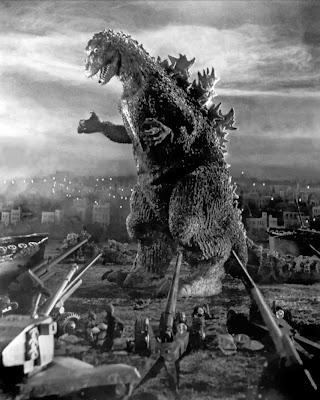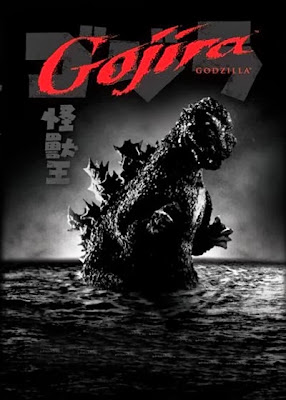(1954 BBC version starring Peter Cushing)

doubleplusgood!
(This Post Does Contain Spoilers)
Cast
Yvonne Mitchell ... Julia
Donald Pleasence... Syme
Arnold Diamond\... Emmanuel Goldstein
Campbell Gray... Parsons
Hilda Fenemore... Mrs Parsons
Pamela Grant... Parsons Girl
Keth Davis ... Parsons Boy
Janet Barrow ... Woman Supervisor
Norman Osborne ... First Youth
Tony Lyons ... Second Youth
Malcolm Knight ... Third Youth
John Baker... First Man
Victor Platt... Second Man
Introduction
"If you want a picture of the future, imagine a boot stamping on a human face forever..."
I vaguely recall a speech made by the former British Prime Minister, Margaret Thatcher back in 1984 when she gloated about how the UK had not become like the place depicted in George Orwell’s novel,1984. Orwell’s novel, however, was not intended to be a prediction of how England or the world would become in the year 1984. Instead, it was intended to serve more as a warning of what could happen if the State is given the opportunity to acquire and exercise unbridled and unchecked power over its citizens. Thank heavens that, unlike the characters in Orwell's world of Oceania in 1984, we at least still have the capacity to "recall" and remember the past as we stumble forward into the future. The question is, can we learn from the past?At the time the book was written, the blight of Nazi Germany under the dictator Hitler was fresh in peoples’ minds, along with the devastation in Europe caused by the Second World War. Britain had just stopped WWII era rationing in 1950, only four years before the BBC production and a year after Orwell’s book was published. There was also the looming Cold War between the United States and its allies on the one hand and the USSR under the Stalin and the Communist Party on the other. The warning signs were definitely there and they provided a solid template for Orwell’s literary warning to his readers about what could happen should a society embark on a particular path that increases the power of the State at the expense of individual freedom and liberty. Since then, we have had the advent of the Cold War between opposing global power blocks and ideologies; Mao’s China and the Cultural revolution; the totalitarian regime of North Korea; wars in Korea, Vietnam, Iraq and Afghanistan; the fear of the spread of Communist ideology and the paranoid Communist witch hunts in the US during the 1950s; fear of terrorism with consequent increases in surveillance and loss of personal privacy; the all-pervasive presence of technology in the hands of governments, corporations and individuals with privacy and personal information implications, and so on…A warning is useless if no-one takes any notice……
In the film, 1984 we see the capacity of the Party / State’s power to destroy individual autonomy, to suppress independent thought, and secure the future for itself by the indoctrination of its children. For the dictatorial Party, the system is not geared to defending the rights of the individual, but rather to maintaining and extending the power of the Party itself.
Winston Smith, played by Peter Cushing, is a bureaucrat and outer-party member who does and says what he is told to do and say. He is, however, a “thought criminal” since he secretly loathes Big Brother and the Party.
Scene: Julia & Winston Meet O'Brien
PART 1: BACKGROUND & SETTING:
"This, in 1984, is London, chief city of Airstrip One, a province of the state of Oceania."
At the beginning of the film we are given a close shot of a huge circular hoarding containing the head and shoulders of a stern-faced moustachioed man (Big Brother), and the slogan;

"BIG BROTHER IS WATCHING YOU."

Amidst a scene of ruin stands the pyramid-shaped edifice of the Ministry of Truth. It and the system it represents grew out of conditions of chaos, war and destruction. Now, like the pyramids of Egypt, it seems that the new order is destined to last for an eternity. The architecture of the Party has been designed to convey a message about the enduring and overwhelming power of the Party. Prominently emblazoned on the sides of the building are the seemingly antithetical statements:
WAR IS PEACE
FREEDOM IS SLAVERY
IGNORANCE IS STRENGTH
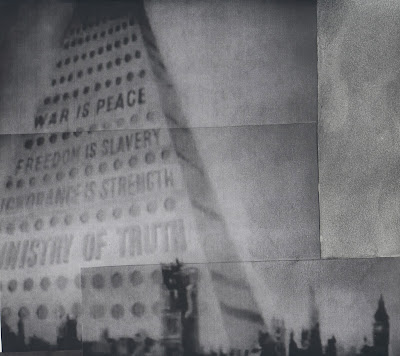
This is a society in which opposing contradictory concepts can be simultaneously held in the mind and accepted because that is the kind of view of reality demanded by the Party of its citizens.
Much later in the film, Winston reads from a book that is given to him by O’Brien. The truth about the nature of the whole social and political order is laid bare;
WINSTON [reads]: 'When the United States absorbed the British Empire to form Oceania, and Russia took Europe to form Eurasia, two of the three World States were in being. Their ideologies were Ingsoc, Neo-Bolshevism, and later Death-Worship in East Asia. These three States are permanently at war.'
JULIA: Then it's not a sham?
WINSTON: Wait! [reads] 'War has changed its character. It exists only to preserve tyranny. Fighting - when there is any - takes place on vague tropical frontiers, or round the floating fortresses. The essential act of war is the destruction of human labour. A way of shattering or sinking the materials which might be used to make the masses too comfortable, in the long run, too intelligent. No invasion of enemy territory must ever take place.'
JULIA: Then the real war isn't with Eurasia at all! It's between all of us...
WINSTON: ...and them! [reads] 'The Party member, like the proletarian, tolerates conditions because he has nothing with which to compare his way of life. Efficiency, even military efficiency, is no longer needed. In Oceania nothing is efficient except the Thought Police. Big Brother...'
JULIA: Does he exist?
WINSTON: [reads] '...is the guise in which the Party shows itself to the world. No-one has ever seen him.'
PART 2: POWER….ABSOLUTE!
THE INDIVIDUAL
Winston Smith (Outer Party Member, KZ 6-0-9-0, Smith W) is not an individual but is instead a number, an entry, a piece of data that can be recorded, filed and referenced when necessary.

A combination of fear and constant surveillance keeps people in line. At the start of the film the camera zooms in on the pyramid and then fades to a close-up of Winston Smith peering out of a circular window out beyond the confines of the Ministry of Truth. He is then yanked back from his “aberrant” behaviour by the Voice of the Telescreen,
"KZ 6-0-9-0, Smith W, face the Telescreen. You have been standing at the window of Bay Two of the Records Department for over eighty seconds, what are you doing there?........This irregularity has been recorded," it concludes with, "Return to your cubicle, Smith."
The various characters that appear before us demonstrate clearly the types of individuals who find themselves caught within the Party’s grasp. First there is Parsons with his overly jovial attitude who believes in and toes the Party line. Second, there is Syme who appears to be intelligent, perhaps too intelligent, and who ardently wishes to be seen to be devoting his intelligence and being to his work or function in that society. Third, is Winston who, although he helps to perpetuate the system, knows and feels deep down inside that there is something definitely wrong with the current state of affairs. However, apart from initial small passive forms of resistance, Winston cannot see any way of doing anything about it for the time being. Finally, Julia, like Winston, abhors the way things are, but she is only concerned with happiness and living and loving for today instead of worrying needlessly about the future and changing the status quo.
The ultimate irony in any mention of the individual in the context of the world of 1984 is that as we shall see below, in the eyes of the Party the individual…….does not truly exist! The individual is the Party and Party is the individual.
THE SOCIAL STRUCTURE
Although it is proclaimed that the Party has supposedly done away with the inequalities of the past, it has in fact encouraged and perpetuated class / social distinctions and inequalities. Notice that at one point when Winston is walking back to his work cubicle, he passes a door marked "INNER PARTY MEMBERS ONLY." Here we see O'Brien, who wears the distinctive uniform of an Inner Party Member which immediately sets his status apart from that of Smith, a drably attired Outer party member.
Another and far larger sector of society consists of the Proles. Syme expresses the kind of prejudiced contempt with which the Party regards the bulk of the population:
“Except the Proles? They're not human. Look at that creature over there with the ladle: "Them stew with salt, them stew without!" Thoughts like that don't need simplifying…….they've no minds, they live by instinct. The Proles are animals."
While in the Prole Sector, Winston comes across a pub where his presence causes the patrons who spot him to stop talking and regard him with suspicious hostility. Here he sees three prole youths fascinated by a pornographic book, two men arguing over the State Lottery and an old man trying to persuade the barman to let him have a pint. The world of this, the largest segment of society, has been reduced to porn, gambling and booze which suits the interests of the Party just fine.
THE MEDIA,
INFORMATION & “TRUTH”
Winston is part of a system that deliberately lies and falsifies information. Past events are altered to fit the requirements of the present as determined by the Party. Things happened as the Party says they happened. The ironically named Ministry of Truth is the Ministry of the PARTY’s Truth.
At Winston’s Speakwrite machine, a message tube shoots out of pneumatic piping. It contains a sheet of newspaper and the Speakwrite gives Winston instructions in a bland and impersonal monotone: "Correction required as follows: The Times of 17th March 1984, copy sent herewith, contains reported speech by Big Brother. He is alleged to have predicted that Eurasian forces would launch an attack in North Africa. Please rectify in accordance with facts."
O'Brien comments a little later, “Such a careless report... must not exist.”

Winston dictates the alteration to the Speakwrite,: "Routine correction to Times of 17th March 1984 where shown. Quote, in his broadcast speech Big Brother referred in confident terms to the probability of a large-scale Eurasian offensive early next month. There is no possible doubt, he said, it will be launched in South India. Other parts are expected to remain quiet. Reprint, enter back-number, and file."
During the organised Two-Minute Hate propaganda session, attendees are presented with the figure of an oriental-looking soldier on the Telescreen who is denounced as,
"The Eurasian butcher, the reveller in atrocity, the world criminal... This is the enemy we can see, but worse than he is the Enemy Within. The Enemy of the People - Emmanuel Goldstein."
The crowd hurl insults and chant "Hate! Hate!" “Freedom is Slavery!” “ War is Peace!” and "Ignorance is Strength!"
On screen Goldstein declares that "The dictatorship of the Party must be overthrown! I call upon the people to destroy the tyrant who calls himself Big Brother!" For the crowd the quite frank and truthful account of the state of affairs in Oceania under the Party comes from the lips of an identifiable and seemingly tangible object of treachery and a threat to their way of life who is fully deserving their frenzied screams of hatred, insults and threats. Here people’s emotions and energies are cleverly being manipulated and channelled in a direction that is useful to the interests of the Party by providing them with a target and a scapegoat - whether real or a construct - on which to unleash their pent-up feelings of anger and hatred. In fact, Goldstein was based on the historical figure Leon Trotsky, a rival and enemy of Stalin who was forced to flee Russia, but who was later assassinated.
Winston, under social / mob pressure, hysteria and influence finds himself repeating, "I hate him!" over and over again. Suddenly we hear him thinking: "I hate Big Brother!" before he recovers and begins yelling, "Down with Goldstein!"
The Telescreen then shows an Eurasian soldier firing his machine gun in the direction of the crowd, to be replaced by the reassuring face of Big Brother whose appearance provokes a chant of, "B-B! B-B! B-B!" whereby the object of hatred is now replaced by the object of unconditional love.
ARTS: LITERATURE & MUSIC
Far from enhancing and extending people’s intellectual, emotional, moral and spiritual horizons, literature and music has been reduced to the lowest common denominator in order to serve the interests of the Party.
In the Ministry of Truth, within "PORNOSEC” we find Julia operating a "PORNORITE Mk VI No. 247 'JASON FLINDERS'". We are informed that "this machine can turn out twenty pornographic novels a day. All phrases and thought sequences were built in during assembly, so that it has its own distinctive style. Its products go out under the name of Jason Flinders." According to the Supervisor there are only “the six basic plots” and as O’Brien observes, “The stuff's rubbish, of course..”
PERCEIVED REALITY:
SOCIAL & ECONOMIC CONDITIONS
In the canteen during lunch we see a prominent poster which reads "REGULATION MEAL 15: STEW, BREAD, CHEESE - 15 CENTS. VICTORY GIN EXTRA." Basic bland nutrition and shortages are the order of the day. While queuing up for their food, Syme asks Winston if he has any spare razor blades, but Smith says he has been using his last one for weeks and that new ones, "don't exist any longer."
When Syme asks Winston how the stew is, he replies with, "It's alright," but suddenly remembers the Telescreen and loudly proclaims: "It's very good!" Close surveillance and fear of repercussions prevent voicing of opinions, or the expression of protest and dissent even when confronted by the reality of circumstances

An announcement from the Telescreen later on informs the population that, "over the past year, our standard of living has risen by no less than twenty percent. All over Oceania, there have been spontaneous demonstrations to thank Big Brother for our new happy life!" This is then followed by an announcement concerning the increase in the chocolate ration to 20 grams. Winston, however, knows it to be a decrease.
Earlier, just prior to the Hate session, Winston had quickly performed another correction, changing a report that pledged no decrease in the chocolate ration, to one reporting a necessary reduction to 20 grams. He then had slipped the original reports through a slot in the wall marked "FOR DESTRUCTION" before heading off to the Hate session.
Now Winston sits thinking, "The chocolate ration was reduced to 20 grams only yesterday. Yes, they believe it - Doublethink - they make themselves believe it. Our new happy life! Grease and grime, the smell of dirty clothes and synthetic gin. And, oh, that stew... Careful - Facecrime!"
Later in his flat, Winston struggles not to allow his thoughts and fears to reveal themselves in front of the Telescreen by an exercise of self-monitoring or self-censorship: "Don't let it show in your face - get rid of this thought! Rid of it, quickly, before it's too late. Doublethink - practice it! The Party says the Earth is flat - true! That's true. The Party says two and two make five... no, and not to know. Forget, and forget that you've forgotten - Doublethink.... Crimestop... Ignorance is strength..."
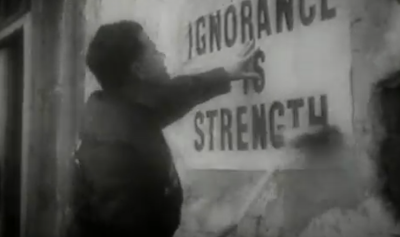
LANGUAGE & THOUGHT
How we think and view the world around us is largely determined by our use of language. The Party knows that if it can control how language is used, it will then be better able to control how people think. In other words, people will only be able to think in the way that the Party wants them to think. In the canteen scene this is taken up by Syme in discussion about his work on the Eleventh Edition dictionary and “Newspeak.”
“We're not only inventing words, we're destroying them - scores of them, thousands every day. It's beautiful………. “The simplicity of it, of course. For one example, just take the word 'good.' If you have that, what need is there for the word 'bad'? 'Ungood' does just as well. Then, instead of a string of vague extra words like 'excellent' and 'splendid', you have 'plusgood', or stronger still 'doubleplusgood'. In Newspeak, the whole notion of goodness and badness will be covered by six words. In reality, by only one word. Don't you see the beauty of that, Winston?........By the year 2050, the whole literature of the past will have gone. Milton, Byron, Chaucer - they'll exist only in Newspeak forms……….The whole aim of Newspeak is to narrow the range of thought. In the end, we make Thought Crime literally impossible because there'll be no words to express it………….. Have you even thought, in seventy years or so, there'll be nobody alive who could possibly understand this conversation we're having?”
PERSONAL PRIVACY
In his flat in the dilapidated Victory Mansions we see Winston sitting down at a small desk set into an alcove next to the Telescreen while a production bulletin is being broadcast. It is clear that he wishes to remain out of sight of the Telescreen while he takes out a pencil and an exercise book from a drawer under the desk. He opens the exercise book to reveal a hand-written title page: "DIARY OF WINSTON SMITH - 1984." The Party has increased its power of intrusive surveillance at the expense of personal privacy, which in Winston’s case has been reduced to the pages of an exercise book in a tiny corner of his room and an equally tiny corner of his being. And it is only there that he can rail against the reality imposed on him by the Party as he writes, “DOWN WITH BIG BROTHER" over and over again.

“EDUCATION”
Parson’s daughter and son wear the uniform of the "Spies" youth group which remind us of the Hitler German youth movement. From a young age children are indoctrinated to know and believe only what the Party wants them to know and believe. Parson’s son reads about the past from a textbook: "In the old days before the glorious Revolution, London was not the beautiful city we know today. It was a dark, dirty, miserable place, where scarcely anybody had enough to eat, and children had to work twelve hours a day for cruel masters who flogged them..." History has been rewritten by the Party and is presented to young impressionable minds as fact, leaving them without anything meaningful with which to compare their current circumstances. After all, in the Oceania, “Ignorance Is Strength.” A little while later the boy reads on, : "The rich men were called... ca-pital-ists. They were fat and ugly with wicked faces, like the one shown on the opposite page." He shows Winston the picture and says: "You're old - did you ever see a ca-pital-ist?" Winston says he doesn't remember. Without memory of past events, we have here a totally manufactured reality in which the Party controls the past, present and future.

His sister, meanwhile spends her time seeking out "traitors" and terrorising her parents who live in constant fear of being denounced to the Party by her. The girl even tries to denounce Winston as he kindly tries to six the Parson’s blocked sink; "Face the Telescreen, comrade. In a moment now he's going to show us what he blocked the pipe up with!"
Society’s youth is used as a tool of control by the Party whereby people are kept in line lest they be denounced as traitors by children who are rewarded for their efforts with medals and a sense of power. For instance, while on a country hike, Parson’s daughter and two other girls followed a strange man they had seen, who they were convinced was a saboteur because he was wearing, "a funny kind of shoe," she'd never seen before. They followed him and eventually told the patrols, who took the man away to the Ministry of Love. Winston’s fearful reaction to the name, the Ministry of Love highlights the irony of its name. and the true nature of that poor man’s destination.
For those brought up under the rule of the Party without a memory of anything other than life under its rule, they are encouraged to see themselves as being “ the Glorious Generation!” whose ambition in life is to “track down all the Thought Criminals and traitors!” and to “shoot them!” and “vaporise them! Whoever they are!!”
SOCIAL / HUMAN RELATIONSHIPS
The Party has even managed to intrude into the personal relationships between people, the emotional bonds involved and even as far as human reproduction and child-rearing. While discussing Winston’s separation from his wife, Parsons states that "Loyalty to the individual is detrimental to the Party." Winston agrees, saying he too was a member of Junior Anti-Sex League.
PARSONS: “We've come a long way since then, haven't we? Soon, the whole new glorious system in operation.”
WINSTON: “Separate the sexes... artificial insemination...”
PARSONS: “Artsem!”
WINSTON: “And institutions for the children.”
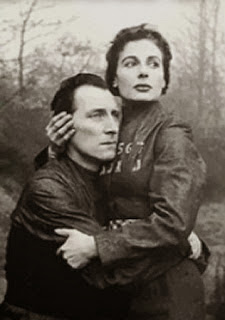
While out in the country with Julia, Winston says that his wife “was beautiful, she hadn't a thought in her head that wasn't a slogan, she submitted to marriage out of loyalty to the state. She had two names for it: making a baby...
JULIA: "...and our duty to the Party."
WINSTON: "You know that one too?"
JULIA: "Sex talks at the Youth League for the over sixteen's. I'd say it's out of date now - they're getting techniques to replace marriage."
WINSTON: "With Katherine there wasn't anything to replace..."
Later during the Hate Week preparations and celebrations Julia observes that “all this marching up and down, and waving flags, and cheering - it's simply sex gone sour."
WINSTON: “Do you mean they depend on all that hysteria all bottled up...”
JULIA:” They can't bear you to feel anything else. When you make love, you use up a lot of energy and then you feel all warm and happy inside, and you don't give a damn for Big Brother and the Three-Years Plan.”
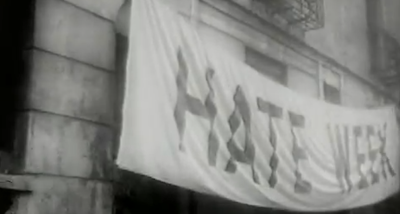
So even people’s emotions, desires and sexual energies need to be channelled toward the Party and the State with even “Love” being reserved solely for Big Brother. NOTHING is permitted if it detracts from the Party / Big Brother.
PART 3: RESISTANCE, DEFIANCE & THE QUEST FOR TRUTH
When the State deprives individuals of all of their freedoms and liberties, robs them of their individuality and uses force and coercion to ensure their conformity and obedience to the dictates of the State, it is of no surprise that people try to react against this using any means at their disposal.
Winston’s first act of defiance is his possession of the personal diary along with the burning realisation and knowledge of what constitutes his situation and his role in helping to perpetuate the Party’s grip on absolute power: "I sit at my desk in the Records Department helping to draw the darkness in. We help to destroy history - there is only an endless present where the Party is always right...."
Winston’s other act of defiance is to actively seek knowledge, in this case knowledge about the past and what conditions were really like before the Party came to power so that he has some basis with which to compare pre- and post-Party worlds. Inside the pub in the Prole sector Winston asks the old man about the changes he's seen since he was a boy, asking if he thinks he has more freedom now than in the past. Unfortunately, he cannot get answers to his questions as the old man is unable to focus his thoughts due to the effects of age and drink.
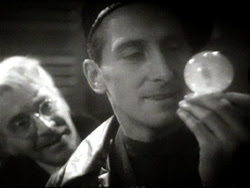
Physical objects and artefacts can present us with another source of valuable information and can come to represent both faith and hope. Winston visits the junk shop owned by Mr Charrington and picks up a water and chalk-filled glass snow-dome / paper-weight. Winston comments on its beauty and Charrington is surprised as few people would make such an observation. The aesthetic beauty of the object stands in sharp contrast to drab, ugly, uniform conformity of the Party’s reality.
In room with Julia above Charrington’s antique store, Winston looks at the glass paperweight and contemplates: "It's like a tiny world with its atmosphere complete. If it were possible to get inside there, to have your life there, and mine, perhaps even to find a new people again..." Like the world he has fashioned within the room with Julia, the paperweight symbolizes something other than a reality imagined and created by the party; a world sustained by beauty and love cut off from and cocooned from the ugly and grim reality of the present.
At one point Winston considers a framed photograph of a church - St Clement's Dane-above the fireplace in the room above the shop. Charrington recites a rhyme
“Oranges and lemons, says the bells of St Clement's...” and gets as far as the second verse - "You owe me five farthings, says the bells of St Martin's" - but can't recall any more."
The act of recalling, remembering and discovering the past is an act of rebellion and defiance against the Party as it brings with it the truth, in this case, as Charrington suggests, "It wasn't always Big Brother, you know?"
Winston’s resistance is fatalistic in that he thinks he knows what the end result will be if he goes down that path. He tells Julia that “in the end we can't win, you know that?......It's just that some kinds of failure are better than other kinds, that's all.” From his point of view it is better to have tried than not to have tried at all.
Winston is determined to seek out the Brotherhood and actively do more, even if it leads to his death before achieving the overthrow of the Party. Winston states that “If little pockets of resistance can be started, just a few records left for the next generation...” He is cut short by Julia who declares; “I'm not interested in the next generation, only in us.” Julia is quite content to carry on what she and Winston are already doing.
For Julia, her act of defiance is a more clandestine and immediate pursuit of happiness in opposition to the Party’s requirements and expectations to “keep an eager face, always shout with the crowd, never shirk anything.” She then shows her disgust with this façade she is forced to maintain by pulling off her checkered waist sash and hurling it to the ground.
Political and social resistance requires some kind of an ideal that provides unity and gives hope to those struggling against oppression in the pursuit of something better. Even if he and Julia are caught be the Party authorities Winston believes “If that happens the only thing that matters is that we should not betray one another” and that “confessing isn't betrayal” since “ what you say or do doesn't matter. Only feelings matter” and that “If you can feel that staying human is worthwhile, even when it can't have any result whatever, then you've beaten them.”
Rebellion and resistance can only be a hollow exercise without a sense of hope and purpose; without understanding present political, social and economic circumstances; without unity of action or a plan for the future. For Julia, rebellion against the Party - except on an individual level such as their own - is futile. and that they must do what they are already doing; staying alive for each other. For Winston, the prole woman outside the window of their room singing a song "The product of an electronic machine, (which) she sings it as if it means something" represents “hope for the future.” He goes on to state;
“Eighty-five percent of the population. If only they became conscious of their own strength - all they need is to rise up and shake themselves like a horse shaking off flies. They'd throw off the Party...”
Julia counters with the cynical observation; “Conscious? They're like a horse alright. Don't you remember the old slogan: "Proles and animals are free." Darling, they think they're free now………The Party gives them exactly what they want.”
PART 4: BREAKING POINT
A point can be reached whereby the power and oppression of the State in its determination to maintain and increase its power over its citizens is so great and overwhelming that all immediately available forms of opposition and resistance are perceived to be futile. It is at this point when indivduals and groups may decide to pursue any means necessary to remove the jackboot from their faces and overthrow their oppressors. Unfortunately such desperation often results in people adopting militant forms of resistance involving acts of violence that are just as brutal and inhumane in their execution and end result as those sanctioned and perpetrated by the State. And so we have Winston telling O'Brien that they believe that there is some organisation working against the Party, and that he and Julia both want to join. They are asked by O’Brien if they are prepared commit acts of sabotage, murder, treachery, blackmail, through to even throwing acid into the face of a child. They acknowledge their acceptance to do so. He goes on to tell them;
“Our only true life is in the future. We shall take part in it as handfuls of dust and splinters of bone. How far away that future is there is no knowing. Perhaps a thousand years of spreading our knowledge outwards from person to person, generation to generation. In the face of the Thought Police there is no other way."
As in the case of the State / Party, adopting such a course means that the end justifies the means for those who take up the cause of such resistance and the needs and very existence of the individual is merely meant to serve, maintain and perpetuate the “Idea.” It begs the question: would that which replaces the current order be just as bad or worse?
This is certainly an uncomfortable question to arise from the recent aftermath of military invasions in the Middle-East and of the so-called Arab Spring revolts. In this case, we have witnessed the fall of totalitarian repressive regimes only to leave the door open to equally repressive political, sectarian and military groups assuming power....absolute power by any means necessary.
PART 5: RESISTANCE IS FUTILE
“Here comes a chopper to chop off your head...”
The Party is able to keep tabs on and control individuals through the use of fear and by eliminating all sense of trust by having citizens willingly monitor one another. For instance, in Winston’s flat, Parsons notices the alcove with the desk and observes, "That's very peculiar.…….I could swear it's out of view of the Telescreen."
The futility of acting and thinking contrary to the dictates of the State is a fact highlighted and there for all in Oceania to see in another sequence where Winston passes the Chestnut Tree Café and sees three elderly men sitting at a table with a chess set under a large poster of Big Brother. A voice sings from the Telescreen: "Underneath the spreading chestnut tree, I sold you and you sold me. They lie here, and here lie we, 'neath the spreading chestnut tree.” Winston recalls the last conspiracy trial and how all three men have changed. According to Syme “They confessed to sabotage, embezzlement of Party funds, intrigues with Goldstein's agents. They confessed - now the Telescreen's reminding them. They were released. They come here every day; for them, the gin's free. They can play chess, if they wish.” As in former Soviet show trials, truth involving the guilt or innocence of those accused of committing treason against the State is not important. The confession extracted by whatever means is all that matters in order to create a false sense of justice at work, to justify the actions of the Party and create a sense of eternal vigilance against real or imagined enemies. The party in this case, however, demands much more from the accused “individual” as we shall see below.

Syme informs Winston that he has received notification that he is suspended from all his duties pending investigation. He asks what it is he could have done to bring this on himself and who could have denounced him. As Winston rushes out of the cafe, the Telescreen commands: "JK 2-1-5-9 Syme B, stand where you are. All other customers in the Chestnut Tree Cafe are to leave immediately. Syme, the Thought Police are joining you...."
Later in their room above the antique shop, Winston tells Julia that he believes Syme to be dead as all trace of him has vanished from their work place, including his name on the list of the Ministry of Truth Chess Club committee members on the noticeboard. Syme is dead in the sense of him being an “unperson” in the eyes of the Party. An observation similarly made by Winston;
“We are the dead.”
Is echoed by Julia;
“We are the dead.”
And is confirmed by the Voice from the Telescreen;
“You are the dead!”
The inevitable has happened….and all that will now transpire is inevitable….


For the Party, however, the threat of fear and pain in order to extract a confession is not enough. More, much more is required of the individual…….
"Start with this thought: the rule of the Party is forever.”
We next see Winston lying in a coffin-like recessed bench with O'Brien sitting nearby. Seven weeks have passed. O'Brien tells an attendant to turn an apparatus up to "one-seventy," thereby increasing Winston's pain. O'Brien asks him if he remembers writing in his diary that, "freedom is the freedom to say that two and two make four?" O'Brien holds up four fingers to him and asks how many he can see. Winston replies, “Four.” O'Brien adds, “And if the Party says it is not four, but five, then how many?” After increasing the pain level again Winston states, “Four... five... four... anything you like... only stop the pain... stop...”
Obrien informs Winston that he has been beaten brutally every day and that he has confessed to assassination, to distribution of seditious pamphlets, to religion, to embezzlement of Party funds, sale of military secrets, sabotage, and murder. He then asks him, “Why do you think we bring people to this place?” It is not merely to make them confess or punish them. O'Brien informs Winston that it is to “cure them” and that Winston has a “disease” in that he is “mentally deranged” and has “a defective memory.” He goes on to tell Winston, “you prefer to be a lunatic, a minority of one” and that “It needs an act of self-destruction - an effort of the will. You must humble yourself before you can become sane.”
For the Party it is not enough to just physically and brutally crush opposition. It is necessary to bring that opposition and all its attendant feelings out into the open so that it can be laid bare and extracted bit by bit until the complete negation of the individual is achieved. The resultant empty void that will be left will be filled by the Party and love for Big Brother. And so we have O'Brien telling Winston, “You do not exist……What happens to you here is forever…….Never again will you be capable of ordinary human feeling; of love, or friendship, or joy of living; of laughter, or curiosity, or courage, or integrity. You will be hollow... we shall squeeze you empty... and then we shall fill you with ourselves.”
We then move onto the question of WHY? Why does the Party / State go to the trouble of robbing the individual of his humanity, individuality, autonomy, sense of self, capacity to love fellow human beings, and unique view and perspective of reality? O'Brien states that;
”The Party seeks power for its own sake, not as a means, but as an end. Power over the human mind, and power over all matter, climate, disease, the laws of gravity... because we control the mind. Reality is inside the skull, Winston. We control the laws of nature.”
O’Brien points out to Winston, "If you are a man, …….You are the last man." He then orders Winston to look at himself in the mirror in which beholds the reflection of a haggard and broken shadow of his former self. "If you are human," O'Brien declares, "Then that is humanity."
All Winston has left, it seems, is his love for Julia, but the Party will even rob him of this last shred of his humanity.
Remember previously in the room above the antique shop how Winston reacted when he saw the rat; We learned that Winston is terrified of rats after a childhood experience. His mother had been taken away for "questioning," and he had stolen his baby sister's pitiful bread ration before running away from their house. Upon his return in the morning, he found his mother had not yet returned, and that the rats had eaten his sister. For Winston the memory and the associated fear always comes back to him in moments of terror, such as when he met Syme in the Chestnut Tree Cafe.
O'Brien points out to Winston that Room 101 is where they “have the means to root out the last lingering deception...,,,,What happens in Room 101 is the worst thing in the world. It varies from individual to individual…….In your case, we both know - of course - that the worst thing in the world happens to be..."
The camera cuts to two rats in a plastic cage. Terror forces Winston to plead with O'Brien to tell him what he wants him to do. O'Brien says that pain by itself is not always enough, and that in Room 101 the prisoner faces the unendurable: "Courage and cowardice are not involved. You will do what is required of you." A mask is attached by a tube to the cage which fits over the prisoner’s head. When the door of the cage is raised the rats…… The mere demonstration, suggestion, anticipation and idea of its inevitability is enough to cause Winston to frantically scream out, "Do it to Julia! Do it to Julia, not me! Julia! I don't care what you do to her! It's Julia! Julia! Not me! Not me!"
The last tattered shred of Winston’s humanity torn to bits, tossed in the dust and stamped on by the Party’s jackboot…
Three months later in the Chestnut Tree cafe.
"Underneath the spreading chestnut tree, I sold you and you sold me. They lie here, and here lie we, 'neath the spreading chestnut tree."
Here we once again see Winston and Julia, but this time we are witness to two husks emptied of life, vitality and humanity;
JULIA: “I betrayed you.”
WINSTON: “I betrayed you.
As the Telescreen presents a bulletin from the Ministry of Peace announcing victory, whereby “our brave troops have utterly routed vastly superior Eurasian forces” solely as a result of Big Brother’s “military genius” we understand the true, ultimate and complete nature of the Party’s victory with Winston’s thoughts: "Love... suddenly... so suddenly. My victory. Love, love, love...
......I love Big Brother..."
Points Of Interest
A Warning
As we have seen, the Party in Nineteen Eighty-Four has manoeuvred Winston Smith into agreeing to commit atrocious acts, captured him, tortured him, and has removed every aspect of his individuality. The bleak ending of the original story and marvellously conveyed by the BBC production of 1984, serves to highlight the fact that hope does in fact exist if we are aware and wary of power being placed in the hands of the State with that power being wielded with the intention to oppress. Even if one lives under a system of government with a long tradition of democratic values and sufficient checks and balances to keep rein in excesses of legislative and judicial powers, it cannot be assumed that it guarantees a country complete immunity from the threat of the expansion of the power of the State at the expense of individual freedom and liberty for all time.
The kind of vigilance that is required on the part of each individual might involve taking time out to consider whether or not the following conditions are beginning to assume greater significance in the national ( and indeed corporate and workplace) and international landscape and are becoming stepping stones toward a more ”Orwellian” destination where awaits the open arms of a…….Big Brother.
- Censorship of ideas that are in opposition to the Establishment, often on the grounds of being in the “national interest.”
- Legislative and “extraordinary” diminution of individual rights and freedoms.
- A state of constant fear of “enemies” from within and without.
- Suppression of peaceful means of protest and assembly.
- Lack of judicial process.
- Increased power and influence of corporate and financial institutions and their bearing on the political sphere.
- Use of violence and intimidation as a means of forcing compliance.
- Increasing use of surveillance and monitoring of people and groups under the guise of “national security.”
- Scapegoating, demonising and targeting of particular individuals and groups for largely political reasons and as a tool of control.
- Sloganeering, propaganda and purely emotive language replacing rational and reasoned debate.
- Judgements being formed about individuals and detrimental action being taken against them on the basis of “information” from informants.
- A widening gulf between those who exercise political, informational and economic power and control and the bulk of the population who do not.
Relevance & Questions Raised
With our greater reliance on technology in the 21st. Century such as Facebook, Twitter, cell / mobile phones, smartphones and Web cams, we can begin to see the relevance that a story like 1984 has to the modern world.
Technology and its uses have had an enormous impact on our culture and it has raised concerns about privacy and freedom. In fact, we must wonder if there is such a thing as privacy in a world where such technologies are ubiquitous. We have seen examples of how technology has enabled people to violate others’ privacy and freedoms. Perhaps this very technology can also serve to protect our privacy and freedoms. Take for instance the revelations concerning US spying and data collection coming from the likes of Edward Snowden and the fact that much of what goes on these days can be captured by a simple mobile phone camera.
In the film we saw how technology was used to ensure the dominance of the state with sinister “telescreens” placed in people’s homes spewing propaganda and conducting surveillance, keeping the population passive and the leadership firmly in control. Such constant monitoring forced people to sterilize their behaviour and conceal their thoughts. Keep in mind that television in Britain was still a novelty in 1954 and many people had just purchased their first television a few months earlier to watch Queen Elizabeth's coronation. After watching the BBC production they may have looked askance at their new TV sets for a while-possibly even Her Majesty herself who also viewed the programme! One would hope that she was at least amused!
The technology of the 21st. Century certainly has the potential to bring about a Big Brother aspect to our daily lives. Consider how much information we willingly volunteer for others’ perusal and how much information is stored about us and shared by various organsiations. But who would have forseen the invasion of our own and of others’ privacy as we turn our lenses on each other and on ourselves in our thirst for attention and recognition? We can in effect all be Big Brothers!
Production
Nineteen Eighty-Four was to be a live production, with a budget of about £3,000. John Hodgkis was commissioned to compose and conduct the music score during the performance from a second studio.
Nineteen Eighty-Four had twenty-eight sets and made use of five or six film sequences coming between the main sequences allowing time to move the artists and cameras from one set to another. The play was to be performed live twice, first on Sunday 12 December 1954, and then again the following Thursday, this being telerecorded and the one being the subject of this post.
Nigel Kneale adapted Orwell's novel for television. The previous year he had created the character of Professor Bernard Quatermass for the popular science-fiction serial The Quatermass Experiment.
The 1954 adaptation of 1984 was produced and directed Rudolph Cartier, a veteran of the UFA film studios in 1930s Germany who had fled the Nazi regime for Britain in 1936, and had worked with Kneale the previous year on The Quatermass Experiment.
Impact
Complaints were received about the "horrific" content such as the infamous Room 101 scene where Smith is threatened with torture by rats.
Concerns were expressed about the depiction of a totalitarian regime controlling the population's freedom of thought.
A Daily Express newspaper report "Wife dies as she watches", involved a 42-year-old lady named Beryl Merfin of Herne Bay who collapsed and died allegedly from the shock of what she had seen.
One motion in Parliament, signed by five MPs, deplored "the tendency, evident in recent British Broadcasting Corporation television programmes, notably on Sunday evenings, to pander to sexual and sadistic tastes". Another motion signed by six MPs, called attention to the fact that "many of the inhuman practices depicted in the play Nineteen Eighty-Four are already in common use under totalitarian régimes."
The Queen and Prince Philip made it known that they had watched and enjoyed the play.
The seven million viewers who watched the Thursday performance was the largest television audience in the UK since the Coronation the previous year.
Videotape recording was still in development and television images could only be preserved on film by using a special recording apparatus ("telerecording") but was used sparingly in Britain for preservation and not for pre-recording. This second performance is one of the earliest surviving British television dramas, and is preserved in the archives so that we after all these year can appreciate its worth.
Additional Notes
Brief Note: (Feb. 2014) See the recent report from the Commission of Inquiry on Human Rights in North Korea to see how a state even in the 21st Century can operate using methods that are chillingly reminiscent of what was presented in Orwell's novel and in the 1954 film version. LINK
Watch also a 1965 film, "It Happened Here" which depicts a German invasion and occupation of Britain and how the Nazis and Fascist forces set about reorganising and maintaining control of society.
NEW!!!! Read about (March 2017) CIA malware targeting of iPhone, Android and smart TVs as revealed in WikiLeaks' publication of confidential documents on the CIA. The CIA's global covert hacking program can be compared to elements of George Orwell's 1984, particularly in relation to the so-called "Weeping Angel", developed by the CIA's Embedded Devices Branch (EDB), which infests smart TVs, transforming them into covert microphones!




